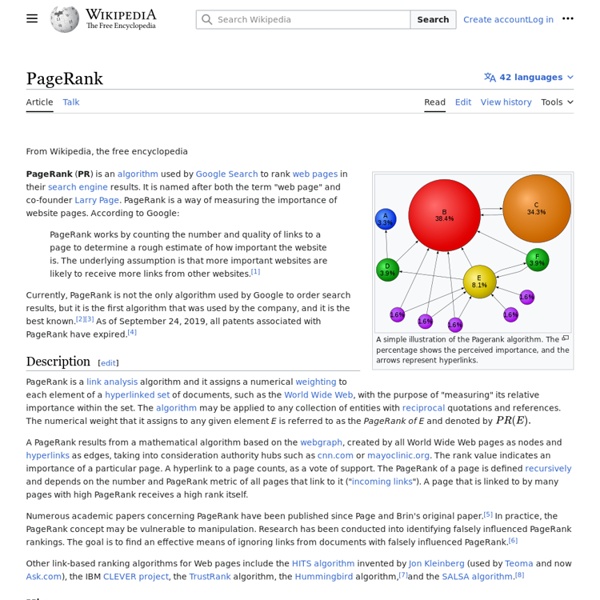How Does Google Work? Learn How Google Works: Search Engine + AdWords
The following infographic was created years ago when Google had a content-first focus on search. In the years since then, the rise of mobile devices has caused Google to shift to a user-first approach to search. We created a newer infographic to reflect the modern search landscape here. Vote on Hacker News, or Bookmark this on Delicious
PewDiePie quit plan prompts YouTube reply
Image copyright Getty Images YouTube has denied making changes to its algorithms, after its most popular star said he would delete his channel. Video gamer Felix Kjellberg, known as PewDiePie, suggested changes to YouTube's algorithms had affected the discoverability of creators' content. On Tuesday, a Forbes report named the Swedish gamer who now lives in the UK as the highest-earning YouTuber. YouTube told the BBC it had not made any changes to its "suggested videos" algorithms.
Google Raters - All About Google Quality Raters
Wow, my post about how Google makes algorithm changes sure got a LOT of attention. While I happened to think the post itself was pretty darn informative (if I can be so humble…lol), it turns out that the majority of folks visiting just wanted a copy of the 2011 Google Quality Raters Handbook. Makes sense, but as most know by now, I was contacted by Google and had to stop sharing and linking to that document. So, let’s move on and talk about these Google Quality Raters.
Ludwig Wittgenstein (Stanford Encyclopedia of Philosophy)
1. Biographical Sketch Wittgenstein was born on April 26, 1889 in Vienna, Austria, to a wealthy industrial family, well-situated in intellectual and cultural Viennese circles. In 1908 he began his studies in aeronautical engineering at Manchester University where his interest in the philosophy of pure mathematics led him to Frege. Upon Frege’s advice, in 1911 he went to Cambridge to study with Bertrand Russell. Russell wrote, upon meeting Wittgenstein: “An unknown German appeared … obstinate and perverse, but I think not stupid” (quoted by Monk 1990: 38f).
New York Times Exposes J.C. Penney Link Scheme That Causes Plummeting Rankings in Google
Today, the New York Times published an article about a search engine optimization investigation of J.C. Penney. Perplexed by how well jcpenney.com did in unpaid (organic) search results for practically everything the retailer sold, they asked someone familiar with the world of search engine optimization (SEO) to look into it a bit more. The investigation found that thousands of seemingly unrelated web sites (many that seemed to contain only links) were linking to the J.C.
Guidelines for Smart Content Curation
On May 8, I delivered a Meet Content webinar about effective content curation for higher ed. This post captures many of the insights I shared in that session. I love this “Dilbert” cartoon where the “digital media curation” professional at a meeting says, in response to someone asking what he does, “Ha ha!
The Fresh Rank Algorithm, Is It More Important Than PageRank
First of all let me confess the term ‘fresh rank’ has been stolen from fellow SEO blogger Justin Briggs, I am going to refer to one of his excellent posts throughout the rest of this one. You will no doubt know about Google’s new QDF upgrade, an algorithm tweak designed to get you to ‘fresh’ content quicker, rather than bringing up old static results. You can see an example of it here; They’re not site links but links to fresh content on the BBC for the search term ‘football’. Google has stated that this affects around 35% of search queries, don’t get that mixed up with searches.
Exploring Curation as a core competency in digital and media literacy education
Keywords: Media Literacy, Curation, Civic Engagement, Digital Learning Introduction In today's hypermedia landscape, youth and young adults are increasingly using social media platforms, online aggregators and mobile applications for daily information use. A 2010 Kaiser Family Foundation study found that 'Eight- to eighteen-year-olds spend more time with media than in any other activity besides (maybe) sleeping-an average of more than 7½ hours a day, 7 days a week.' The Pew Research Center's Project for Excellence in Journalism Center's (2012) annual State of the Media report found information consumption habits migrating significantly towards digital platforms.
Specify your canonical
Carpe diem on any duplicate content worries: we now support a format that allows you to publicly specify your preferred version of a URL. If your site has identical or vastly similar content that's accessible through multiple URLs, this format provides you with more control over the URL returned in search results. It also helps to make sure that properties such as link popularity are consolidated to your preferred version.




Howard Rheingold's insight: Every time you Google, you are using an augmented collective intelligence engine. PageRank is the algorithm that weights the inbound links to web pages as "votes" for that page's significance. Certainly no blogger thinks "I'm making Google more intelligent and contributing to its value" when adding a link to a website. More likely, they think "this is a valuable link for the attention of my public." By figuring out how to measure the informational value of websites through a mathematical manipulation of its inbound links, Google created a collective intelligence engine (and, to the benefit of Google's stockholders, created an attention magnet for displaying advertising messages -- a case of a public good that is also a concentrator of private wealth. by noosquest Mar 30